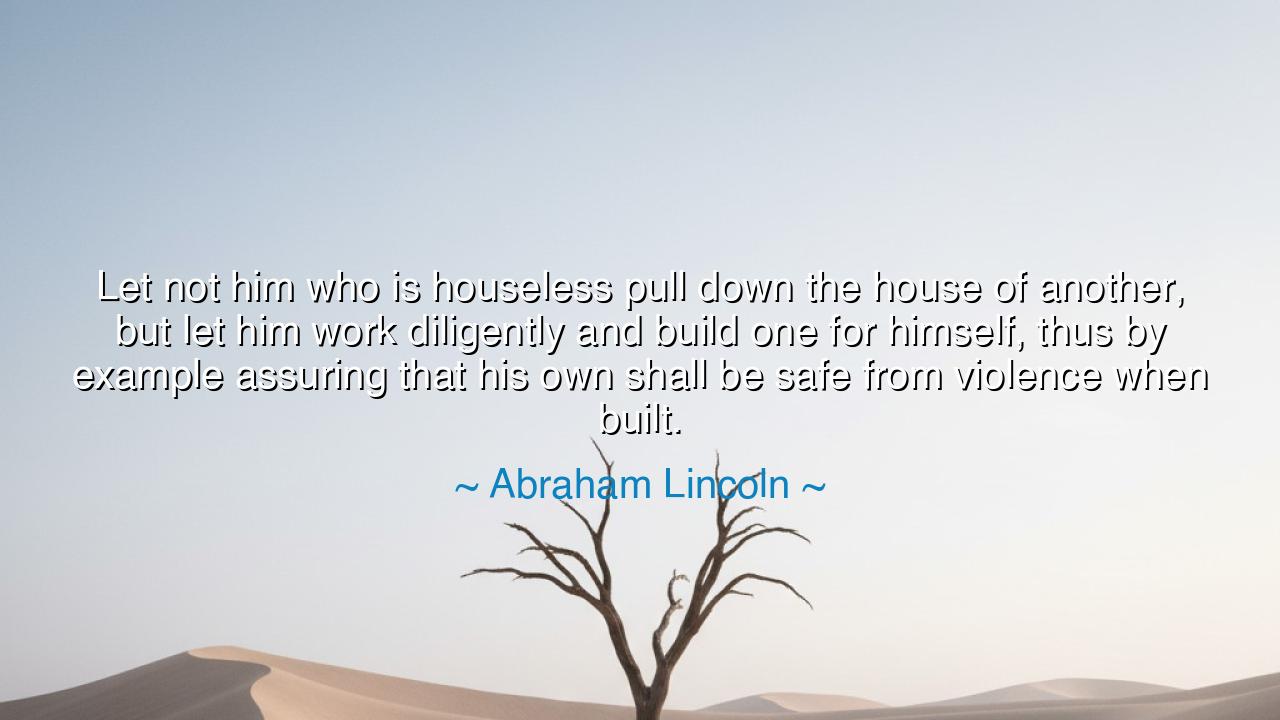
Let not him who is houseless pull down the house of another, but
Let not him who is houseless pull down the house of another, but let him work diligently and build one for himself, thus by example assuring that his own shall be safe from violence when built.






Hearken, O children of the ages, to the words of Abraham Lincoln, who speaks with the voice of justice and wisdom: “Let not him who is houseless pull down the house of another, but let him work diligently and build one for himself, thus by example assuring that his own shall be safe from violence when built.” Herein lies the eternal teaching that envy and destruction are paths of ruin, while labor, patience, and creation cultivate security, honor, and lasting fulfillment.
In the chronicles of old, the elders observed that the heart of man is often tempted by resentment, wishing to claim the fruits of another through force or guile. Yet such acts sow only chaos and insecurity. To work diligently and build one’s own house is to honor effort, to claim one’s rightful place, and to demonstrate virtue through example. Lincoln reminds us that creation, not destruction, fortifies both spirit and society.
The origin of this wisdom is ancient, found in the teachings of sages, philosophers, and builders who revered labor and self-reliance. Across kingdoms, villages, and temples, it was known that the one who envies and destroys will inherit nothing but fear and instability, while the one who labors to build becomes a guardian of prosperity and justice. By cultivating diligence, the soul secures not only shelter but integrity and respect.
O seekers, understand that the act of creation is a sacred duty. To build with hands, heart, and mind is to participate in the eternal rhythm of growth and preservation. The house of another, though tempting in its allure, must remain untouched; for through envy and theft, one destroys not only property, but the spirit itself. Lincoln teaches that safety and honor are born from diligence, not violence, and that example guides others toward virtue.
Let this teaching endure, children of the future: labor with purpose, respect the fruits of others, and embrace the power of constructive effort. By building one’s own house, by working with integrity and perseverance, one ensures that what is created is lasting, safe, and honored. Destruction may gratify for a fleeting moment, but creation sustains for generations.
In this eternal truth, the mortal learns that security, respect, and virtue are the fruits of diligence and creation. The houseless, by choosing to work diligently and build rather than destroy, becomes a beacon of wisdom and strength. Through effort, patience, and example, the spirit ensures that the blessings of life—shelter, honor, and peace—are preserved, safeguarded, and enduring.
If you wish, I can also craft a more poetic, ceremonial version, where the houseless, diligence, and the sacred act of building are depicted as a rite of virtue and enduring wisdom. Would you like me to do that?






TBPhuong Trinh Bui
This quote by Lincoln feels deeply rooted in the idea of integrity and honor—building your life without causing harm to others. But what about when the system itself feels like it's built on inequality? Can this principle still apply in a world where not everyone has the same starting point? Or is Lincoln’s advice better suited to personal conflicts rather than societal issues?
DDuo
Abraham Lincoln’s words seem like a call for self-reliance and hard work, but I wonder if they place too much emphasis on individual responsibility. What happens when the system is unfair, and one person’s struggle is caused by circumstances beyond their control? Can we truly say ‘work diligently’ to someone who doesn’t have the resources or opportunities to do so?
DLHo dang lap
The idea of not pulling down others to build your own life is powerful, but it raises an interesting question—how do we define 'work diligently'? For those facing extreme hardship, the idea of building something for themselves may seem impossible. Does this quote assume that everyone has the same opportunity to work diligently, or is it acknowledging the need for social change?
HP16 duong hoang phuoc
Lincoln’s quote makes me think about the importance of working for what you want, rather than resorting to violence or destruction. It’s a reminder that resilience and perseverance are key. But can this really apply universally? In some situations, people might feel desperate and might not have the same opportunities. Is this quote too idealistic for some, or is it a valuable principle?
TNThao Nguyen
Abraham Lincoln's words strike a powerful balance between personal responsibility and justice. The idea of not tearing down another’s house to build your own seems to reflect a larger societal value—working hard and building something that’s truly yours. But in today’s world, how do we reconcile this with systemic inequality? Is it always easy to ‘work diligently’ when the playing field isn't level?